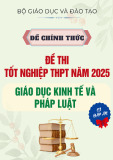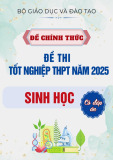
S GD & ĐT ………..Ở
TR NG THPT ……..ƯỜ
Mã đ thi: 216ề
Đ THI TH K THI THPT QU C GIA L NỀ Ử Ỳ Ố Ầ
1
Năm h c 2019 – 2020ọ
Môn: TI NG ANHẾ
Th i gian làm bài: 90 phútờ
H và tên thí sinh:……………………………………………………..S báo danh:…………………..ọ ố
HI N T I MÌNH ĐÃ BIÊN T P ĐC 80 Đ ÔN THI THPT QU C GIA CÓ L I GI I CHIỆ Ạ Ậ ƯỢ Ề Ố Ờ Ả
TI T C TH . B N NÀO CÓ NHU C U LIÊN H V I MÌNH NHÉ. Ế Ụ Ể Ạ Ầ Ệ Ớ
Email- giangty2020@gmail.com/ Sđt: 0963.226.296
SECTION A (8 points):
Mark the letter A, B, C, or D on your answer sheet to indicate the word whose underlined part differs
from the other three in pronunciation in each of the following questions.
Question 1: A. character B. switch C. chemical D. christmas
Question 2: A. addition B. advantage C. adventure D. advertise
Mark the letter A, B, C, or D on your answer sheet to indicate the correct answer to each of the following
questions
Question 3: It is ________work of art that everyone wants to have a look at it.
A. such unusual a B. such an unusual C. so an unusual D. a so unusual
Question 4: As a millionaire who liked to show off her wealth, Mrs. Smith paid________we asked.
A. four times as much as B. four time as many as
C. four time as many as D. four time much than
Question 5:________, I would give a party.
A. Should she come next month B. If she come next month
C. She were to come next month D. If she came here now
Question 6: He was very lucky when he fell off the ladder. He________ himself
A. must have hurt B. should have hurt C. will have hurt D. could have hurt
Question 7: The teacher, along with her students,________going to school at the moment.
A. is B. was C. were D. are
Question 8: Her mother,________has been working for thirty years, is retiring next month.
A. whose B. whom C. that D. who
Question 9: The man________at the blackboard is our teacher.
A. standing B. to stand C. stood D. stands
Question 10: In a formal interview, it is essential to maintain good eye________with the
interviewers.
A. contact B. touch C. link D. connection
Question 11: We are going to________
A. have our house be redecorated B. have our house redecorated
C. have our house to be redecorated D. get our house being redecorated
Question 12: I suggest the room________before Christmas.
A. be decorated B. were decorated C. should decorate D. is decorated
Question 13: "Your parents must be proud of your result at school". - " ________"

A. I am glad you like it. B. Sorry to hear that.
C. Thanks. It's certainly encouraging. D. Of course
Question 14: The theory of relativity________by Einstein, who was a famous physicist.
A. is developed B. developed C. develops D. was developed
Question 15: Without my parents' support, ________my overseas study.
A. had not completed B. would not have completed
C. will not complete D. did not complete
Question 16: She isn’t________well with the new manager.
A. going on B. keeping on C. taking on D. getting on
Question 17: The last student________was John.
A. to be interviewed B. who is interviewed
C. whom was interviewed D. for interviewed
Question 18: You should look up the meaning of the new in the dictionary________misuse it
A. so as to B. to C. so as not to D. so that
Question 19: ________is to give strangers your address.
A. What must never you do B. That must never you do
C. That you must never do D. What you must never do
Question 20: Maria: “I’m taking my end-of-term examination tomorrow.” Sarah: “________.”
A. Good day B. Good luck C. Good time D. Good chance
Question 21: They asked me a lot of questions,________I couldn’t answer.
A. most of which B. of which most C. most of that D. of that most
Mark the letter A, B, C, or D on your answer sheet to indicate the word whose stress differs from the
other three in pronunciation in each of the following questions
Question 22: A. kindergarten B. Contaminate C. curriculum D. conventional
Question 23: A. attend B. visit C. apply D. appear
Question 24: A. attendance B. security C. obedient D. candidate
Mark the letter A, B, C, or D on your answer sheet to indicate the word(s) CLOSEST in meaning to the
underlined word(s) in each of the following questions
Question 25: I received housing benefit when I was unemployed .
A. out of work B. out of practice C. out of fashion D. out of order
Question 26: Before the interview, you have to send a letter of application and your résumé to the
company.
A. recommendation B. photograph C. reference D. curriculum
Question 27: GCSEs are not compulsory, but they are the most common qualifications taken by 14-16-
year-old students.
A. fulfilled B. required C. specialized D. applied
Mark the letter A, B, C, or D on your answer sheet to indicate the word(s) OPPOSITE in meaning to the
underlined word(s) in each of the following questions
Question 28: “That is a well-behaved boy whose behavior has nothing to complain about”
A. behaving nice B. behaving cleverly C. good behavior D. behaving improperly

Question 29: Punctuality is imperative in your new job.
A. Being late B. Being cheerful C. Being courteous D. Being efficient
Mark the letter A, B, C, or D on your answer sheet to indicate the underlined part that needs correction
in each of the following questions
Question 30: The assumption tha t smoking has bad effects on our health have been proved.
A. that B. effects on C. have been D. proved
Question 31: I like the fresh air and green trees of the village which I spent my vacation last year.
A. the fresh air B. green trees C. which D. my vacation
Question 32: The General Certificate of Secondary Education (GCSE) is the name of a set of English
qualifications, generally taking by secondary school students at the age of 15-16 in England
A. the name B. a set of C. taking D. at the age
Question 33: Full-time jobs for men are declining, while more women are finding part- and full-time work.
The result is declining social status for men so they lose their role as the sole financial provider.
A. while B. is C. so D. as
Question 34: I told him I'd prefer to walk , but he insisted to give me a lift .
A. prefer B. to walk C. to give D. a lift
Read the following passage and mark the letter A, B, C, or D on your answer sheet to indicate the correct
word or phrase that best fits each of the numbered blanks from 35 to 44.
You will make the interview process easier for the employer if you prepare relevant information
about yourself. Think about how you want to present your (35)______, experiences, education, work style,
skills, and goals. Be prepared to supplement all your answers with examples that support the statements you
make. It is also a good idea to review your resume with a critical eye and (36)______areas that an employer
might see as limitations or want further information. Think about how you can answer difficult' questions
(37)______and positively, while keeping each answer brief.
An interview gives the employer a (38)______to get to know you. While you do want to market
yourself to the employer, answer each question with an honest (39)______.
Never say anything negative about past experiences, employers, or courses and professors. Always think of
something positive about an experience and talk about that. You should also be (40)______. If you are
genuinely interested (41) the job, let the interviewer know that.
One of the best ways to show you are keen on a job is to demonstrate that you have researched the
organization prior to the interview. You can also (42)______interest by asking questions about the job, the
organization, and its services and products. The best way to impress an employer is to ask questions that
build upon your interview discussion. This shows you are interested and (43)______close attention to the
interviewer. It is a good idea to prepare a few questions in advance, but an insightful comment based on
your conversation can make an even stronger statement. At the (44)______of an interview, it is appropriate
for you to ask when you may expect to hear; from the employer.
Question 35: A. pressures B. strengths C. practices D. promotions
Question 36: A. hide B. limit C. express D. identify
Question 37: A. accurately B. rightly C. hardly D. sharply
Question 38: A. change B. practice C. way D. chance
Question 39: A. ability B. response C. expression D. respect
Question 40: A. enthusiast B. enthusiasm C. enthusiastic D. enthusiastically

Question 41: A. for B. on C. with D. in
Question 42: A. appear B. show C. conceal D. cover
Question 43: A. spend B. pay C. choose D. make
Question 44: A. end B. close C. finish D. final
Read the following passage and mark the letter A, B, C, or D on your answer sheet to indicate the correct
answer to each of the questions from 45 to 54.
A survey is a study, generally in the form of an interview or a questionnaire, which provides
information concerning how people think and act. In the United States, the best-known surveys are the
Gallup poll and the Harris poll. As anyone who watches the news during campaigns presidential knows,
these polls have become an important part of political life in the United States.
North Americans are familiar with the many “person on the street” interviews on local television
news shows. While such interviews can be highly entertaining, they are not necessarily an accurate
indication of public opinion. First, they reflect the opinions of only those people who appear at a certain
location. Thus, such samples can be biased in favor of commuters, middle-class shoppers, or factory
workers, depending on which area the news people select. Second, television interviews tend to attract
outgoing people who are willing to appear on the air, while they frighten away others who may feel
intimidated by a camera. A survey must be based on a precise, representative sampling if it is to genuinely
reflect a broad range of the population.
In preparing to conduct a survey, sociologists must exercise great care in the wording of questions.
An effective survey question must be simple and clear enough for people to understand it. It must also be
specific enough so that there are no problems in interpreting the results. Even questions that are less
structured must be carefully phrased in order to elicit the type of information desired. Surveys can be
indispensable sources of information, but only if the sampling is done properly and the questions are worded
accurately.
There are two main forms of surveys: the interview and the questionnaire. Each of these forms of
survey research has its advantages. An interviewer can obtain a high response rate because people find it
more difficult to turn down a personal request for an interview than to throw away a written questionnaire.
In addition, an interviewer can go beyond written questions and probe for a subject’s underlying feelings
and reasons. However, questionnaires have the advantage of being cheaper and more consistent.
Question 45: What does the passage mainly discuss?
A. The principles of conducting surveys
B. The importance of polls in American political life
C. The history of surveys in North America
D. Problems associated with interpreting surveys
Question 46: The word "they" in line 7 refers to
A. interviews B. news shows C. North Americans D. opinions
Question 47: According to the passage, the main disadvantage of person-on-the-street interviews is that
they
A. reflect political opinions B. are used only on television
C. are not carefully worded D. are not based on a representative sampling
Question 48: The word "precise" in line 10 is closest in meaning to
A. rational B. accurate C. required D. planned
Question 49: According to paragraph 3, which of the following is most important for an effective survey?

A. An interviewer's ability to measure respondents' feelings
B. Carefully worded questions
C. A sociologist who is able to interpret the results
D. A high number of respondents
Question 50: The word "exercise" in line 12 is closest in meaning to .
A. consider B. design C. utilize D. defend
Question 51: The word "elicit" in line 15 is closest in meaning to
A. rule out B. bring out C. predict D. compose
Question 52: It can be inferred from the passage that one reason that sociologists may become
frustrated with questionnaires is that
A. respondents are too eager to supplement questions with their own opinions
B. respondents often do not complete and return questionnaires
C. questionnaires are expensive and difficult to distribute
D. questionnaires are often difficult to read
Question 53: According to the passage, one advantage of live interviews over questionnaires is that live
interviews .
A. minimize the influence of the researcher B. are easier to interpret
C. can produce more information D. cost less
Question 54: Which of the following terms is defined in the passage?
A. Representative sampling B. Response rate
C. Public opinion D. Survey
Read the following passage and mark the letter A, B, C, or D on your answer sheet to indicate the correct
answer to each of the questions from 55 to 64.
Although most universities in the United States are on a semester system, which offers classes in the
fall and spring, some schools observe a quarter system comprised of fall, winter, spring, and summer
quarters. The academic year, September to June, is divided into three quarters of eleven weeks each
beginning in September, January, and March: the summer quarter, June to August, is composed of shorter
sessions of vary length.
There are several advantages and disadvantages to the quarter system. On the plus side, students who
wish to complete their degrees in less than the customary four years may take advantage of the opportunity
to study year round by enrolling in all four quarters. In addition, although most students begin their
programs in the fall quarter, they may enter at the beginning of any other quarters. Finally, since the physical
facilities are kept in operation year round, the resources are used effectively to serve the greatest number of
students. But there are several disadvantages as well. Many faculty complain that eleven-week term is
simply not enough for them to cover the material required by most college coursed. Students also find it
difficult to complete the assignments in such a short period of time.
In order to combine the advantages of the quarter system with those of the semester system some
colleges and universities have instituted a three-term trimester system. In fourteen weeks, faculty and
students have more time to cover material and finish course requirements, but the additional term provides
options for admission during the year and accelerates the degree programs for those students who wish to
graduate early.
Question 55: Which of the following would be the best title for this passage?

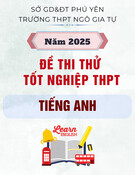

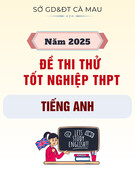
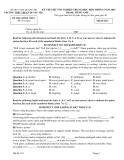
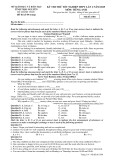
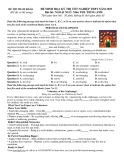
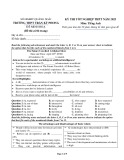
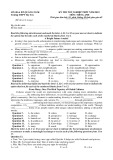
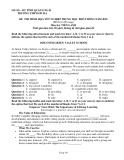
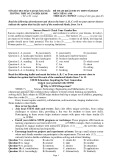








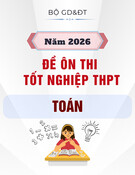

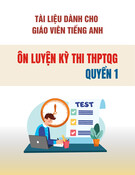
![Đề thi tiếng Anh tốt nghiệp THPT 2025 (Chính thức) kèm đáp án [mới nhất]](https://cdn.tailieu.vn/images/document/thumbnail/2025/20250627/laphong0906/135x160/9121751018473.jpg)

